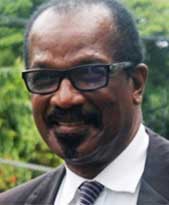More often lately, social activists have increasingly been advocating for measures to address the growing concerns of social ills within society
The activists discern that there are inherent and perpetual factors that precipitate the issue of criminal activity in the communities and a concerted effort needs to be made to ‘nip it the bud’.

Former Home and Legal Affairs Minister, Dr. Velon John has put forward a set of policy guidelines in the steps to tackle this ominous situation. Cognizant of the ‘worsening crime situation’ in St Lucia, Dr. John delivered a national presentation, which gives rise to ‘an insightful, instructive and critical tool for discussions on how to deal with crime in a small society like ours’.
Over the past years, Dr. John has been credited for his passion to speak out on the disturbing and increasing incidence of crime in the country. And crime in its multifarious manifestations and ubiquitous locations has always aroused his interest both academically and pragmatically.
Bearing in mind that recent developments are not only disturbing but also alarming and frightening; a societal condition of panic has almost engulfed the nation. Dr. John’s presentation is intended to sensitize the concerned and thinking populace.
Dr. John sincerely hopes that this exercise will in some measure persuade “our people to focus due attention to this dystopian plunge into the abyss of crime and violence.”
To emphasize the urgency and necessity of his presentation, Dr. John asserted: “This paper, which in some measure is a compilation of my thoughts over a period of time, reflects my thinking on the generic issue of the breakdown of Law and Order, its linkages with relevant societal components, and its attendant consequence of the tsunami of crime that has engulfed and alarmed our society by its ubiquity, heinousness, constancy, and plurality.”
As concerned citizens of the nation, he says, the country is in a state of crisis and so consequently, there “is the urgent and desperate need for innovative, creative, pragmatic thinking, and strategies to deal with this criminogenic scourge.”
Dr. John noted that this multifarious “alarming and disconcerting incidence and the phenomenon of crime is not peculiar to St. Lucia. It is a virtual feature of our vaunted Caribbean civilization. Jamaica, Trinidad and Tobago, St. Kitts/Nevis, and others are caught up in this criminogenic pandemic.”
In contextualizing the overall situation, he said, global developments have shown “the patent need to transcend parochial, partisan and political divides and come together as a nation to deal with the crisis of crime here in St. Lucia.”
He adds that…” in this context partisan politics is woefully dysfunctional, though, and paradoxically so, crime needs to be politicized as our immanent proclivities or propensities constrain our aspiring sublimation.”
Dr. John contends that to say that crime should not be politicised is inane; for the very provenance of crime is inextricably linked with (1) human conduct that has been proscribed by the various arms or organs of government and (2) the human condition that must be addressed by the body politic.
He explains that while crime is an inevitable feature of every society, governments need to place more focus on the areas of Education and Health and formulate this issue as a policy matter.
Dr. John opines that “The seemingly inherent or acquired need to score political points seems to be the order of the day; and this precludes the appreciation and acceptance of objective, cogent, edifying and meritorious views and suggestions which in the final analysis leave us wallowing in a mire of dysfunctional, mediocre commonality that is antithetical to the rigours of creative thought and action, that are needed to adequately deal with the crisis of our time.”
He asks, “What can we do, individually and collectively? … How can we rehabilitate him or her, who has not been rehabilitated? That is contextually speaking. What can the Government do? What can the nation do? What can you do?”
Dr. John cautions that, the “amoral” elements need to be contained and the regression of self, of budding personalities and character, must be stopped. He declares: “As I see it, the shift and shifting generations are watching and they are in some measure lost. They are increasing perhaps not exponentially, but they are.
And so what needs to be done very urgently and for the survival of the society is the focusing of therapeutic, remedial attention on the homes and schools of the nation.”
Taking a critical outlook of the situation, Dr. John urges that, “Structures need to be put in place to ventilate the dysfunctionalities that exist in the many homes and schools of this society. School curricula must be changed and expanded to embrace elements of conflict resolution, etiquette, critical thinking, team building, crucial conversations, leadership skills, ego-building, spiritual orientation, and of course patriotism.”
He adds that neighborhoods need to be socially sanitized. “There has to be a curricula change that will produce better educated, well-adjusted and balanced young girls and boys. From the homes and schools, a youth population must emerge that is in dynamic equilibrium with the salubrious norms of the society.”
Dr. John notes that, “And so intrusive or invasive measures will have to be taken, so that the domestic environment is in conformity with the rules, regulations, and laws of the nation in its diverse institutional format.”





